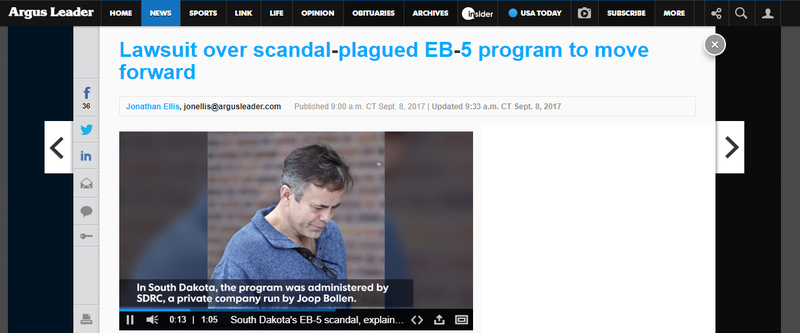Lawsuit over scandal-plagued EB-5 program to move forward
A DACA vigil was held at Meldrum Park in Sioux Falls, South Dakota in response to President Trump ending the program earlier in the day.
A federal judge has refused to dismiss a lawsuit filed against the architect of the state’s EB-5 immigrant investor program and 65 Asian investors after finding possible violations of public policy and state law.
Judge Charles Kornmann also noted that federal and state officials neglected to oversee the program, and he outlined the tangled business dealings that generated millions of dollars in potential profits.
Joop Bollen had sought to be dismissed from the lawsuit brought by Tentexkota LLC and eight of its members, including country music star Kenny Alphin. Tentexkota was an investor in the Deadwood Mountain Grand, a hotel, casino and event center, borrowing $32.5 million from EB-5 investors.
After defaulting on the loan, a company controlled by Bollen filed suit to collect the money from Tentexkota and each of its eight members who had also signed personal guarantees for the EB-5 loans. Tentexkota and its members countersued, arguing that under the rules of the EB-5 program, the Asian investors were supposed to make at-risk loans. The personal guarantees violated the EB-5 rules, the Tentexkota members argued, and were thus void.
Kornmann ruled that Tentexkota defaulted on its loan from the EB-5 investors, but he wrote that there were issues of material fact about whether its members and their personal guarantees are legal.
Meanwhile, in not dismissing Bollen or the 65 Chinese investors who loaned Tentexkota the money, Kornmann paved the way for the parties to take depositions and gather evidence.
The decision leaves open another chapter into the state’s EB-5 scandal. EB-5 is a federal immigration program that enables foreign aliens to obtain visas to the United States by investing at least $500,000 and creating 10 jobs in qualifying economic development projects.
As a state employee, Bollen ran the program through the Department of Tourism and Development. But in 2009, he quit his job and signed a contract to run it through a private company he created called SDRC. SDRC was then used to recruit Chinese and Korean investors into South Dakota projects, and Benda set up additional partnerships and companies to funnel money to projects.
South Dakota’s use of the program came under federal and state investigation after Richard Benda, a former cabinet secretary who Bollen had reported to, went to work for SDRC after diverting $550,000 in state tax money to SDRC. Benda committed suicide as state officials prepared to indict him.
In his 15-page ruling, Kornmann noted that privatizing the program under Bollen came “with no apparent supervision from either the state or the federal government.” Kornmann also detailed how SDRC made a windfall at various points in funding the Deadwood Mountain Grand.
SDRC was to receive 1 percent of the loan – in this case 1 percent of $32.5 million. In addition to paying $500,000, each of the 65 investors in the project were required to submit a one-time $45,000 fee to pay for administrative costs. They were also required to pay $5,000 a year each as a “management fee,” and a subsidiary of SDRC also collected additional interest payments.
“Mr. Bollen denies ever having profited financially from SDRC,” Kornmann wrote. “I fail to understand this contention since SDRC received large sums of money, either directly or through a subsidiary.”
Kornmann also noted the complexity of the EB-5 dealings, referring to the Deadwood Mountain Grand deal, one of about a dozen South Dakota projects funded under Bollen, as a “maze of business entities.”
“As I went through the tangle of paperwork in this case, including the offering memorandum, different limited partnerships, limited liability companies, management agreements, consulting agreement, agreements as to loan origination fees, escrow agreements, personal guarantees and pledge agreements, credit agreements, forbearance agreements, government or development company agreements for aid to entities involved with the Black Hills investment and arrangements between and among the various entities, as well as the creation of and management of SDRC, Inc., I am reminded of the words of the lyrical Tevye from Fiddler on the Roof, that these matters would be ‘enough to cross a Rabbi’s eyes,’” he wrote.
Mentions
Litigation Cases
States
- South Dakota
Securities Disclaimer
This website is for informational purposes only and does not constitute an offer or solicitation to sell shares or securities. Any such offer or solicitation will be made only by means of an investment's confidential Offering Memorandum and in accordance with the terms of all applicable securities and other laws. This website does not constitute or form part of, and should not be construed as, any offer for sale or subscription of, or any invitation to offer to buy or subscribe for, any securities, nor should it or any part of it form the basis of, or be relied on in any connection with, any contract or commitment whatsoever. EB5Projects.com LLC and its affiliates expressly disclaim any and all responsibility for any direct or consequential loss or damage of any kind whatsoever arising directly or indirectly from: (i) reliance on any information contained in the website, (ii) any error, omission or inaccuracy in any such information or (iii) any action resulting therefrom.




